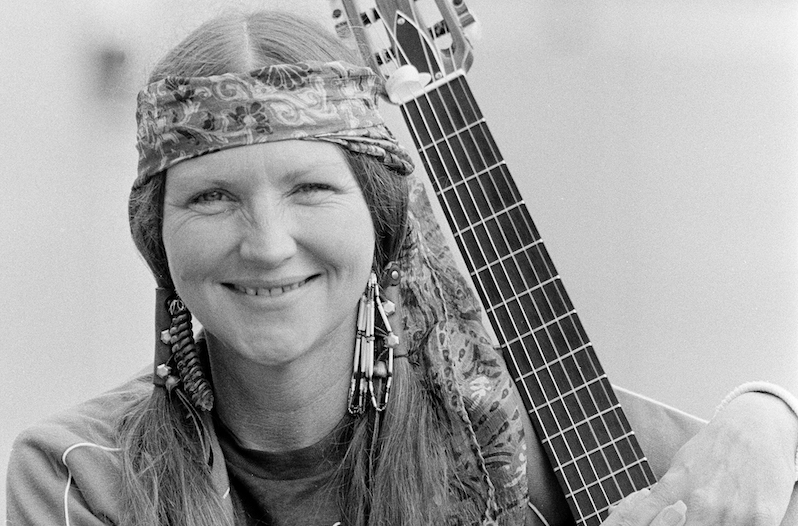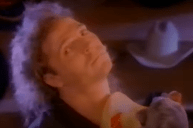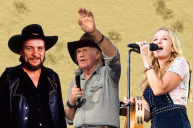Wide Open Country's new series 'Unsung Heroes' spotlights overlooked artists from the '80's and '90's, with a focus on those whose lack of chart success did not equate a lack of musical quality. It begins with a profile of global phenomenon Rattlesnake Annie.
Videos by Wide Open Country
Few folk, blues and country music artists have lived a more interesting life than Annie McGowan, who's better known by her stage name Rattlesnake Annie. From her pre-teen years to today, she's sat under Ma Rainey and Pasty Montana's learning trees, remained one of Willie Nelson's dearest friends and maintained creative independence.
Born Rosan Gallimore on Dec. 26, 1941, the future Rattlesnake Annie was raised in Puryear, Tennessee, near the Kentucky state line. Her family farm lacked electricity, so Annie entertained herself with songs learned from her musically inclined father and the African American laborers in nearby cotton patches.
By age 12, Annie and two cousins formed hillbilly group the Gallimore Sisters. Local live performances and regular appearances on Paris, Tennessee radio station WTPR prepared the trio to win a statewide contest to perform on the Grand Ole Opry stage. Per Annie's Columbia/CBS Records bio from 1987, the prize found the wide-eyed Gallimore girls appearing on the same bill as Maybelle Carter and encountering their first flush toilet and motel room.
A relative from her dad's side of the family, fellow Puryear native Byron Gallimore, became a go-to producer in the '90's for Tim McGraw, Faith Hill and others.
Annie, a woman of Cherokee and Scotch-Irish descent, earned her nickname at a young age by insisting that visitors to her family's land never harm rattlesnakes or spiders.
"The rattlesnake is the healing sign of the Cherokee," she told the Associated Press in 1983. "I just thought we can't do battle against the snakes.
"I still can't figure out why people are scared of snakes," Annie added. "I think it's religion."
At age 16, Annie left home for Memphis, where she sat in on Beale Street performances by Rainey, Lightnin' Hopkins and others. Next came a stay in Huntsville, Alabama, where Annie performed at The Carriage House, a nightclub frequented by high-ranking NASA officials.
In the late '60's, Annie moved to Texas, where she met two important figures in her story, Nelson and future husband Max McGowan.
"I first saw him at a bar in Grand Prairie; there was about 12 people there," Annie says of Nelson in her Columbia/CBS Records bio. "I sure liked what he was doing, so I went up to him afterwards and we talked and played songs for each other. We've been friends ever since."
Annie recorded her first country single, "Texas Lullaby," in 1974. It's the same song later covered by another longtime confidant, David Allan Coe.
That first single, plus prior protest songs addressing the Civil Rights Movement and Vietnam War, reflected a level of personal integrity and professional excellence that's remained steadfast.
"Audiences are mesmerized by her contralto voice, a voice that carries passion and that carries her own story," wrote Kathleen Hudson, author of Women in Texas Music: Stories and Songs. "When you listen to Rattlesnake Annie, you get far more than just the song."
From there, Annie wrote and self-produced critically acclaimed albums, including 1980's Rattlesnakes & Rusty Water and her 1985 breakthrough Country Livin'. Much of her music appeared on her own Rattlesnake Records imprint and reached a global audience through self-booked tours in such far-reaching places as the former Czechoslovakia, where she recorded the album Rattlesnake Annie & The Last Cowboy with regional country singer Michal Tu?ný.
Annie broke ground for American country performers through her world travels, from her '70's tours of Eastern Bloc countries to her 1989 recording contract with Sony Music Japan, which brought us the album Indian Dream. It was as if Annie's work as a songwriter was only "too country" back home, where she was a musician's musician but not a widely recognized star.
An attempt to right that wrong came after the global success of Country Livin' caught the attention of CBS Nashville's Rick Blackburn.
"Most acts come in here and they want to lick my boots to get a deal, but her attitude was 'What can CBS Records do for me that I haven't already been doing quite well for myself?,'" Blackburn says in Annie's bio.
Annie's self-titled CBS/Columbia release arrived in 1987 and included a duet version of "Long Black Limousine" featuring Nelson as well as "Goodbye to a River," Memphis legend Lonnie Mack's "Funky Country Livin'" and one of the most underrated songs of the '80's, "Country Music Hall of Pain."
As was normal at the time, a major Nashville label paired its newest signee with an impressive cast of session musicians, including fiddlers Vassar Clements and Johnny Gimble and harmonica players Charlie McCoy and Buddy Greene.
Rattlesnake Annie found more to do in Nashville than jam with some of its finest musicians. Her natural charisma made her a standout performer during appearances on TNN's New Country and other programs.
After her '80's run as a potential Music City star, Annie continued cutting great albums, such as 1992's Painted Bird, featuring "Cherokee Eyes," a tribute to the first woman chief of the Cherokee Nation, Wilma Mankiller. Annie also recorded tribute albums for Nelson and Hank Williams.
Like many of today's top Americana acts, Annie may have limited her upward trajectory in Nashville by refusing to acknowledge arbitrary genre boundaries. For at least part of the 21st century, she's lived in Spain, where she's spent more time studying flamenco and jazz music than plotting a country music comeback.
Read More: Willie Nelson and Sons Perform Quarantine-Friendly Version of 'Hello Walls' on 'Colbert'
Through a 21st century lens, Annie represents the sort of self-sufficiency and creative freedom sought by Nelson and his fellow outlaws (not to mention punk rockers and other DIY artists). By the time major labels came calling, Annie's popularity overseas and the respect earned from artists back home meant Music Row needed her free spirit more than her free spirit needed them.
Now Watch: These Willie Nelson Duets Will Blow Your Mind
https://rumble.com/embed/u7gve.v3v86n/




